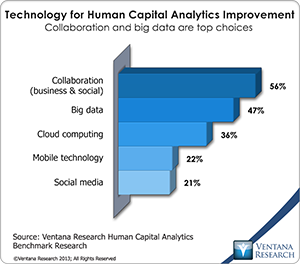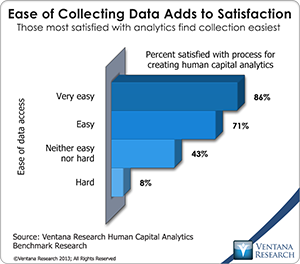Learning is an integral component of human capital management, and a new generation of learning management systems advances learning in organizations around the world. These systems have evolved over the years from a classroom scheduling tool that facilitated instructor-led and classroom training into an array of enterprise applications that deliver and track various types of training. Recently new technologies, such as business analytics, cloud computing, social collaboration, and mobile technology have become part of the learning management process. To assess the impacts of this ongoing shift, Ventana Research is conducting benchmark research on how organizations are implementing and using this new generation of systems.
Until now learning management systems have been designed to take defined content from a few instructional sources and instructors and distribute it through an organization according to a defined process flow. While that approach will always have a place to accomplish some basic learning objectives, customers are now seeking to apply to learning new tools that enable collaboration in the learning process, access through mobile devices and embedded advanced analytics that help evaluate effectiveness of learning programs.
The previous generations of learning management systems were limited in flexibility. They could use only a few types of content and lacked the ability to share knowledge widely and easily. In addition, providing access to learning content only through a Web browser limits access to content to those with laptops and network access. This excludes employees and managers who travel frequently from having convenient access to learning content and related tasks. Now advances in mobile technology for learning management are coming to market.
Other processes in human capital management also are affected by these next-generation technologies, as several instances of our benchmark research show. In our social collaboration research more than half (57%) of participants said social tools are important in recruiting. In research on human capital analytics, collaboration is the most sought-after technology enhancement, by more than half of organizations. This also is the case in our next-generation workforce management research. It is clear that business is making collaboration a priority for HCM in general, and learning management will adopt it as well. Social collaboration provides several ways for employees to engage with others, empowering contact with knowledge sources, tracking activity streams, broadcasting information and using video for live or recorded sharing. Even newer methods measure outcomes through gamification techniques that rate individuals’ activity and provide rewards that enhance their stature in the organization. These approaches can augment more formal learning and encourage people to embrace it more.
by these next-generation technologies, as several instances of our benchmark research show. In our social collaboration research more than half (57%) of participants said social tools are important in recruiting. In research on human capital analytics, collaboration is the most sought-after technology enhancement, by more than half of organizations. This also is the case in our next-generation workforce management research. It is clear that business is making collaboration a priority for HCM in general, and learning management will adopt it as well. Social collaboration provides several ways for employees to engage with others, empowering contact with knowledge sources, tracking activity streams, broadcasting information and using video for live or recorded sharing. Even newer methods measure outcomes through gamification techniques that rate individuals’ activity and provide rewards that enhance their stature in the organization. These approaches can augment more formal learning and encourage people to embrace it more.
 In addition, our human capital analytics benchmark shows that organizations are employing more complex learning metrics using advanced analytics tools within learning systems. The learning metrics that most companies are tracking today are performance after learning has occurred (which 64% do) and retention rates, which correlate learning to retention of workers (39%). These and other sophisticated metrics require the ability to combine data from other systems with learning management data. The research shows that companies that have human capital analytics systems to facilitate collection of data from multiple systems are more satisfied (86%) with their system than are those whose system lacks such capabilities.
In addition, our human capital analytics benchmark shows that organizations are employing more complex learning metrics using advanced analytics tools within learning systems. The learning metrics that most companies are tracking today are performance after learning has occurred (which 64% do) and retention rates, which correlate learning to retention of workers (39%). These and other sophisticated metrics require the ability to combine data from other systems with learning management data. The research shows that companies that have human capital analytics systems to facilitate collection of data from multiple systems are more satisfied (86%) with their system than are those whose system lacks such capabilities.
The objectives of our new learning management benchmark research will include interest levels in the different next-generation technologies, rates of adoption and specific organizational areas where more investment is occurring or desired. It also will explore how different segments rate and use this technology, comparing employees to managers and executives, companies of various sizes and industry sectors. It will assess intentions for integrating next-generation learning management with other HCM applications, particularly talent and workforce management, and how that may change from past learning management efforts. Learning plays an integral role from onboarding new employees through career development and in compliance to policies and regulations. Evaluating these and other related questions can reveal where adopters may find the greatest return on investment in advanced learning management.
Overall this benchmark research will provide valuable insights for organizations using or planning to use advanced learning management systems. The early insights this research uncovers into best practices and benefits will help organizations save time and resources and make shrewd technology investments. With the global economy growing and companies competing for the best available talent, understanding how advanced learning management systems can help retain talent, share knowledge more effectively and increase productivity can be a competitive differentiator. Please look here for my analysis of advancements and key insights from this benchmark research.
Regards,
Ventana Research











